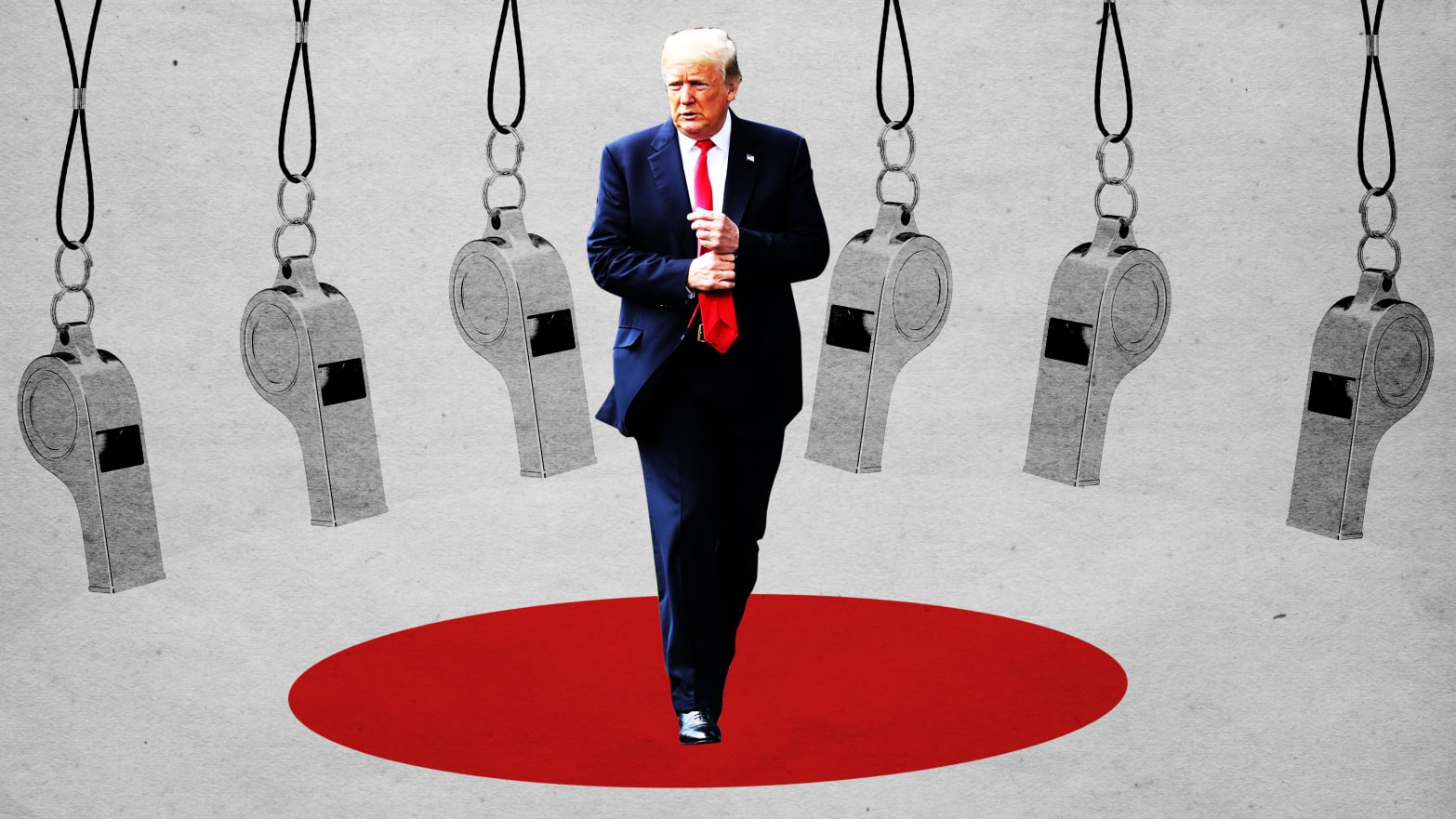At a critical juncture in his presidency, facing a rapidly unfolding impeachment inquiry by House Democrats, Donald Trump is feeling besieged by snitches.
In recent weeks, numerous leaks have appeared in the pages of The Washington Post, The New York Times, The Wall Street Journal, and other major papers and news outlets detailing the president’s attempts to enlist foreign leaders to help dig up dirt on former Vice President Joe Biden and also aid Trump’s quest to discredit Special Counsel Robert Mueller’s concluded investigation. And as is his MO, the media-obsessed president has been fixated on not just the identity of the whistleblower behind the internal complaint that brought this scandal to the fore, but also on who, exactly, has been namelessly feeding intel to the press.
In the course of casual conversations with advisers and friends, President Trump has privately raised suspicions that a spiteful John Bolton, his notoriously hawkish former national security adviser, could be one of the sources behind the flood of leaks against him, three people familiar with the comments said. At one point, one of those sources recalled, Trump guessed that Bolton was behind one of the anonymous accounts that listed the former national security adviser as one of the top officials most disturbed by the Ukraine-related efforts of Trump and Rudy Giuliani, the president’s personal attorney who remains at the center of activities that spurred the impeachment inquiry.
“[Trump] was clearly implying [it, saying] something to the effect of, ‘Oh, gee, I wonder who the source on that could be,’” this source said, referring to the president’s speculation. Bolton, for his part, told The Daily Beast last month that allegations that he was a leaker in Trump’s midst are “flatly incorrect.”
The former national security adviser—who departed the administration last month on awful, mutually bitter terms—is working on a book about his time serving Trump, and has “a lot to dish,” one knowledgeable source noted.
Neither Bolton nor White House spokespeople provided comment for this story. Matt Schlapp, an influential conservative activist with close ties to the White House, said his assumption was that the leaks were coming from “career folks inside who hate Trump” and that the president and his campaign had “14 months of this” to come. As for Bolton, Schlapp said, “He’s smarter than that, although he does aggressively defend himself.”
Indeed, Bolton’s name surfaced Monday before House impeachment inquiry committees, when Hill reportedly testified that he told her to alert the chief lawyer for the National Security Council that Giuliani was working with Mick Mulvaney, the acting White House chief of staff, on an operation with legal implications, the Times reported late Monday. “I am not part of whatever drug deal Rudy and Mulvaney are cooking up,” Bolton told Hill to tell White House lawyers, according to sources familiar with the testimony.
“I have not spoken to John about [his comments, as conveyed by Hill],” Giuliani told The Daily Beast on Tuesday morning. “John is a longtime friend. I have no idea why John is doing this. My best guess is that he’s confused and bought into a false media narrative without bothering to call me about it.”
Regarding Bolton’s reported comment about Mulvaney being involved in this figurative Ukraine “drug deal,” the former New York City mayor insisted that “Mick wasn’t involved in this. I don’t recall having any lengthy conversation with him about this subject... I don’t recall ever having a lengthy conversation [about Ukraine] with John, either.”
Trump has felt under siege from within before, including at various flashpoints of his presidency. For instance, near the end of the Mueller probe, the president became so distrustful and resentful toward Don McGahn, his own White House counsel at the time, he started asking those close to him, “Is [Don] wearing a wire?”
But the current sense that he has been undermined by people whom he brought into his orbit has come at a critical juncture and colored some of the decisions he has made since the whistleblower complaint became public. The president has openly declared that the whistleblower committed an act of treason. He has attempted to stop prominent advisers—including Ambassador to the European Union Gordon Sondland, a man who donated $1 million to the Trump inauguration—from testifying to Congress, only to apparently fail. On Monday, Fiona Hill, Trump’s former top adviser on Russia and Europe, was on Capitol Hill, where she reportedly told lawmakers that Sondland and Giuliani circumvented the standard national-security process on high-profile Ukraine matters. The president has struggled to add to his current legal team, and appeared to begin putting some distance between himself and Giuliani last week.
And when outside allies began to talk about constructing a war room to help with impeachment, Trump shot down the concept, in part out of a sense that he couldn’t rely on them to get the message out right. One top White House aide subsequently labeled the idea an exercise by “outside peeps trying to self-aggrandize.”
The impression left on Republicans is one of a president increasingly driven by paranoia and a desire for insularity—and not, necessarily, to his own benefit.
“There is a certain level of frustration that all the sudden the president says something, then Rudy does, and it is not always consistent. There is a frustration that not everybody knows what they should be doing. It is not that they can’t defend the president it is a frustration that they don’t know exactly how they are supposed to defend the president,” said John Brabender, a longtime GOP consultant. “From the president’s perspective, this whole thing is a witch hunt and is outrageous and, therefore, it shouldn’t even need explanation…But with that said, you can’t just be angry. You need a unified communications team.”
According to those who’ve known the president, the sense that a good chunk of the government has never fully accepted his presidency and has actively worked to undermine it has animated much of his activity over the past few weeks. And though they believe he has a point, they also wonder if it is making him functionally incapable of taking the advice of some advisers: to simply ignore impeachment and apply his attention to other facets of governance.
Trump, they add, is preternaturally incapable of ignoring press about him and lingers particularly on leaks that depict atmospherics of his inner sanctum, the West Wing, and his internal well-being.
“In my experience, what he despises is somebody writing that Donald Trump feels under siege and his emotions are this and his thinking is this,” said Sam Nunberg, a former Trump campaign aide. “He hates people saying what he is thinking… And one of his most frequent tricks in terms of talking about himself on background [as an anonymous source] is him having the reporter say [he is] someone ‘familiar with the president’s thinking.’”
Nunberg said he had yet to see a blind quote in any recent report that would lead him to believe that Trump is cold-calling reporters. But the president is certainly working the fourth estate. Democratic aides were left shaking their heads last week when they received an email from the White House with the subject line, “Article from President Trump” and a PDF attachment of a Kimberly Strassel Wall Street Journal column.
“He’s apparently so anxious about GOP support in the Senate, he’s taken to sending WSJ columns against the House inquiry,” said a Senate source.
Still, for all of Trump’s grousing and preoccupation with who is and isn’t stabbing him in the back, loyalty has always been a one-way street for this president. Last week, after the news broke that Lev Parnas and Igor Fruman, two Soviet-born businessmen tied to Giuliani, were arrested on charges of violating campaign-finance law, a reporter at the White House asked Trump if the former New York mayor was still his personal attorney. The president responded that he didn’t know.
Though the president would later tweet out his support for Giuliani over the weekend, Trump has a long track record for being loyal to and supportive of a longtime associate, friend, or staffer—up until the moment he’s not. Perhaps the quintessential example of this is that of one of the president’s former attorneys, Michael Cohen, who famously turned on Trump after becoming convinced that the president had abandoned him while he was in the crosshairs of federal prosecutors.
Asked by The Daily Beast last week if the president told him that he still had his lawyer’s back—an attorney who further earned the president’s trust by defending Trump during the Mueller investigation—Giuliani let out a big belly-laugh and responded, “There’s nothing, [no knife], in my back.”
“My back feels very comfortable right now,” he added.


